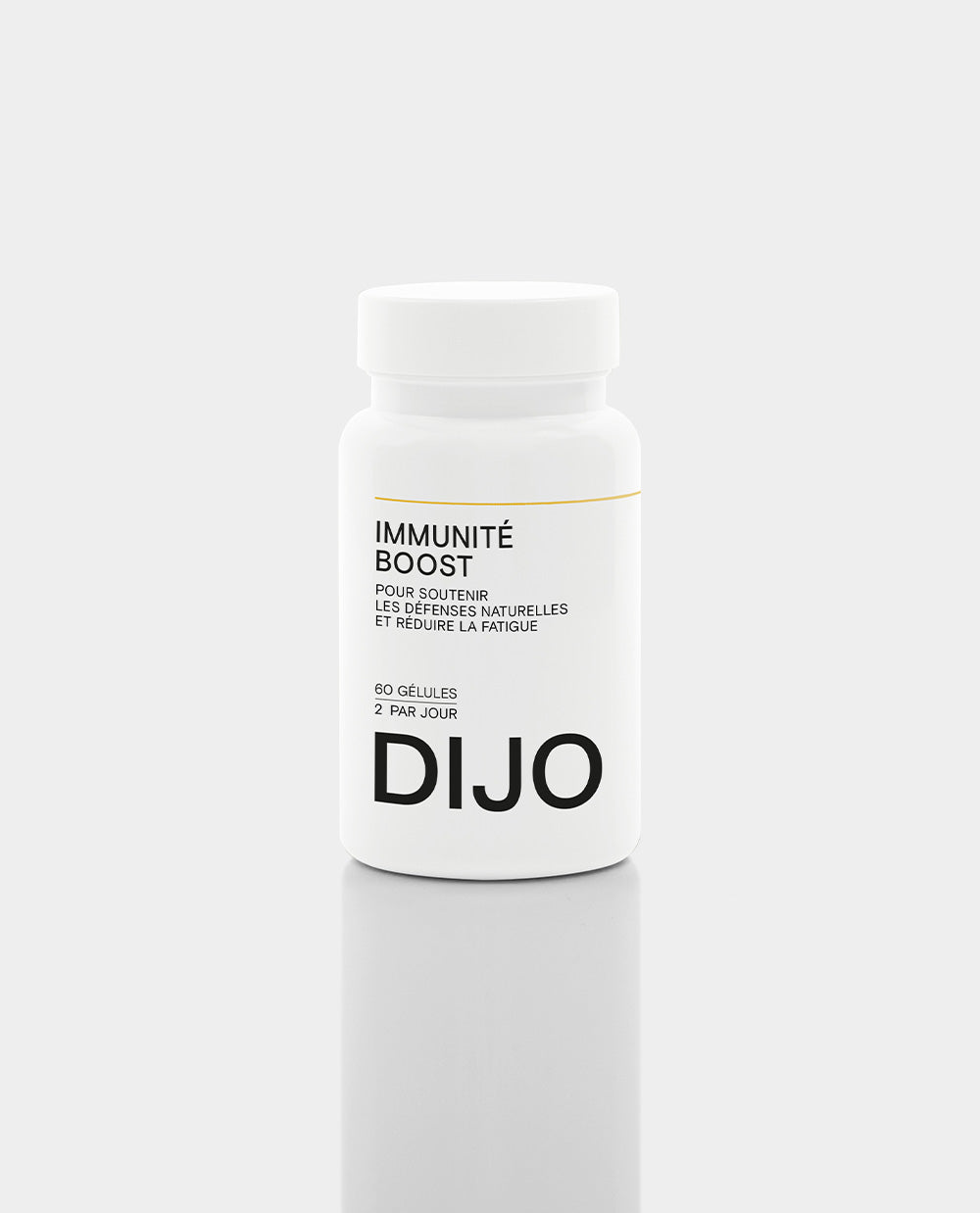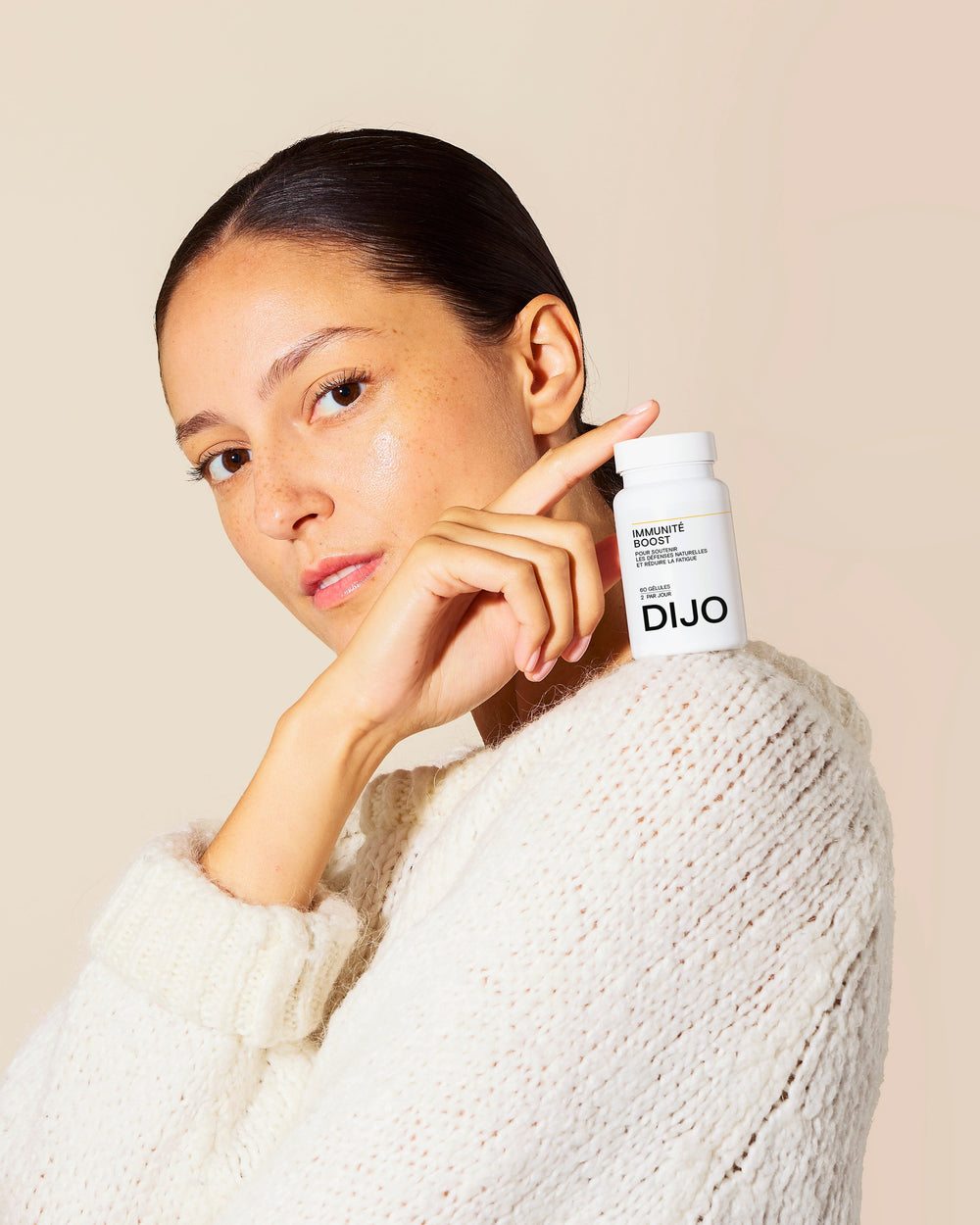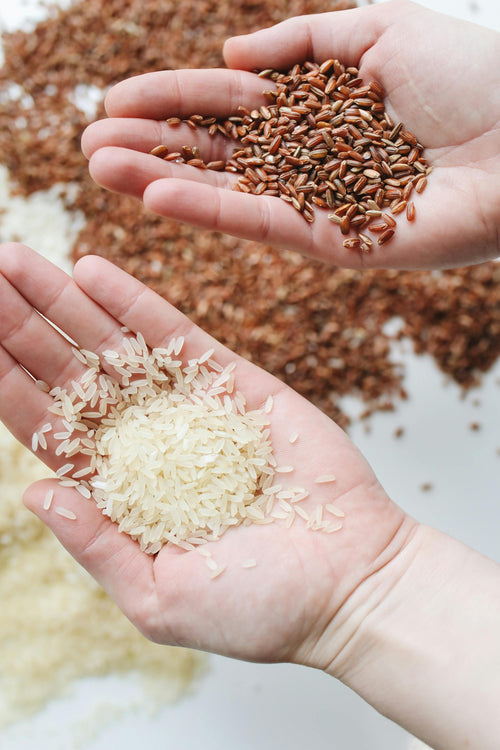To remember :
- Zinc is an essential trace element which is involved in more than 300 vital enzymatic reactions (DNA synthesis, blood clotting, immune defense, etc.)
- Zinc citrate is a highly bioavailable derived form of zinc.
- Zinc contributes to the normal functioning of the immune system.
- Zinc keeps the skin healthy thanks to its anti-oxidant, healing and anti-inflammatory powers.
What is Zinc?
Definition of Zinc
You are probably familiar with zinc, an essential trace element present in trace amounts in the human body. It is present in all tissues of the human body at an amount of 2g, but is mainly concentrated in muscles, bones and the liver. This element plays a crucial role in more than 300 vital enzymatic processes such as DNA synthesis, blood clotting, the immune defense system or growth.
Sources of Zinc
The main food sources of zinc are meat, offal, cheese, legumes, fish and seafood (oysters, crabs). The food plants that generally contain the most zinc are wheat and various seeds (sesame, poppy, alfalfa, celery and mustard). However, the bioavailability of zinc, that is to say its ability to be assimilated by our body, is closely dependent on the presence of phytates, fiber and lignin in cereals and legumes. These compounds reduce its absorption by forming insoluble, indigestible complexes in the digestive tract. Therefore, it can be difficult to obtain enough zinc to cover our daily needs through diet alone.
A second source of zinc, in the form of zinc citrate with better bioavailability, in the form of dietary supplements may prove beneficial.
What is Zinc Citrate?
Zinc citrate is a derived form of zinc. It is made up of a zinc molecule associated with citrate, an organic salt derived from citric acid found in fruits. Zinc citrate is a form with a high zinc content (31.2%), presented in the form of a white powder with a neutral taste and high bioavailability. Indeed, the ability of our body to absorb the zinc present in a food supplement depends on the bioavailability of the zinc used. Zinc citrate is commonly used as an active ingredient in cosmetic skin and hair care products.
What are the benefits of Zinc Citrate?
Zinc is necessary for the metabolic activity of more than 300 enzymes in the body and is considered essential for cell division, DNA and protein synthesis. Thanks to zinc citrate, we benefit from all the benefits of zinc which is easily assimilated by the body.
Zinc citrate and the immune system
It is well known that zinc is an essential trace element, influencing growth and affecting the development and integrity of the immune system . Numerous studies have shown that zinc has a broad impact on key mediators of immunity, including cytokines. These chemical messengers, secreted by white blood cells, help regulate and coordinate immune responses by communicating between different immune cells. Thus, zinc helps increase the production of T lymphocytes which have the capacity to specifically recognize cells infected by a virus or bacteria and destroy them.
Zinc citrate and skin
To maintain healthy skin, there is nothing like zinc! It exerts its many benefits thanks to its anti-oxidant properties, its healing properties and its anti-inflammatory action. An ally for beautiful skin at any age.
A recognized antioxidant, zinc acts on the activity of a specific enzyme, superoxide dismutase (or SOD) in order to strengthen the skin's epidermis, fight against oxidative stress and therefore protect cells from premature aging . A powerful healing agent, zinc also promotes wound healing by helping epidermis cells to regenerate more quickly.
However, zinc is mainly used in acne solutions. It acts as a cleansing, anti-bacterial and mattifying agent. By regulating sebum production, zinc helps maintain healthy and balanced skin.
Zinc citrate and energy metabolism
Thanks to its intervention in major metabolic pathways (carbohydrates, lipids and proteins) and its involvement in numerous enzymatic reactions, zinc contributes to the maintenance of normal energy metabolism.
Zinc also plays a major role in maintaining normal acid-base metabolism , allowing the body to maintain a normal pH.
Signs of Zinc deficiency
When a zinc deficiency is felt, many metabolic pathways are impacted. The first signs of zinc deficiency are skin disorders, brittle nails and hair, wounds that do not heal as effectively, and a weak immune system.
Zinc deficiency is common, particularly among pregnant women, people following a vegetarian diet, people with diabetes and even the elderly because the absorption rate of zinc decreases with age.
Indications and dosage of Zinc
Unfortunately, our body cannot synthesize or store zinc. This is why it is important to ensure sufficient daily intake, either through food or through supplementation. Health authorities have estimated daily zinc requirements at approximately 11 micrograms per day in adult men and 8 micrograms per day in adult women. These needs are higher in pregnant and breastfeeding women: around 11 micrograms per day. However, you should know that these needs can increase depending on certain elements which can interfere with its intestinal absorption. Indeed, the bioavailability of zinc is closely dependent on dietary factors such as caffeine and phytates (present in cereals and legumes) which reduce its absorption. There may also be interference between zinc and copper, with excess of one reducing absorption of the other.
A maximum dose has been set at 40 mg per day for an adult. Beyond this maximum limit, possible adverse effects, such as headache, nausea, vomiting and a metallic taste in the mouth may occur.
Bring Zinc to your body thanks to DIJO
At DIJO, we are committed to supporting you in your well-being care routines. This is why we developed Focus Energy and Immunity , a true ally of the immune system composed of flavonoids with prebiotic effects which contribute to maintaining your defense system and your energy. Prebiotics are the food for good bacteria, called probiotics , naturally present in our body.
In addition, due to its optimal concentration of zinc citrate, guarana, ginseng, vitamin C and vitamin D3 from lichen, our Energy and Immunity Focus contributes to maintaining good joint, bone and muscle health, and healthy skin . , reducing mental fatigue and strengthening natural defenses . This treatment offers you a natural approach for your overall well-being.
Sources :
[1] Dardenne, M. (2002). Zinc and immune function. European Journal of Clinical Nutrition, 56(S3), S20–S23. doi:10.1038/sj.ejcn.1601479
[2] Wegmüller, R., Tay, F., Zeder, C., Brnić, M., & Hurrell, RF (2014). Zinc absorption by young adults from supplemental zinc citrate is comparable with that from zinc gluconate and higher than from zinc oxide. The Journal of nutrition , 144 (2), 132-136.
[3] Yee, BE, Richards, P., Sui, JY, & Marsch, AF (2020). Serum zinc levels and efficacy of zinc treatment in acne vulgaris: A systematic review and meta‐analysis. Dermatologic therapy , 33 (6), e14252.
[4] Jafari, A., Noormohammadi, Z., Askari, M., & Daneshzad, E. (2022). Zinc supplementation and immune factors in adults: a systematic review and meta-analysis of randomized clinical trials. Critical Reviews in Food Science and Nutrition , 62 (11), 3023-3041.



















